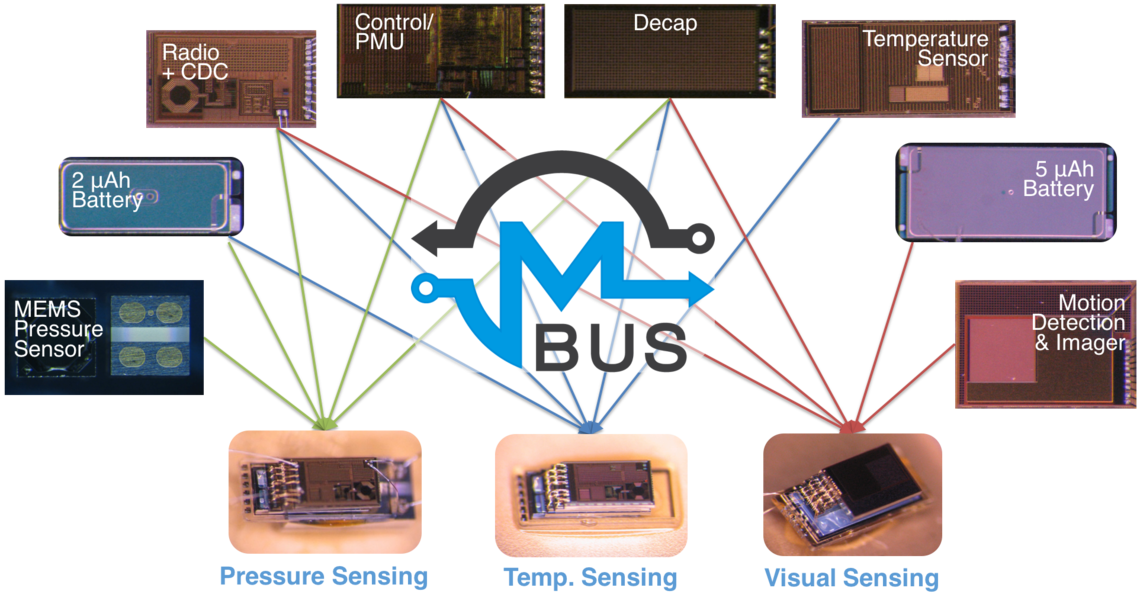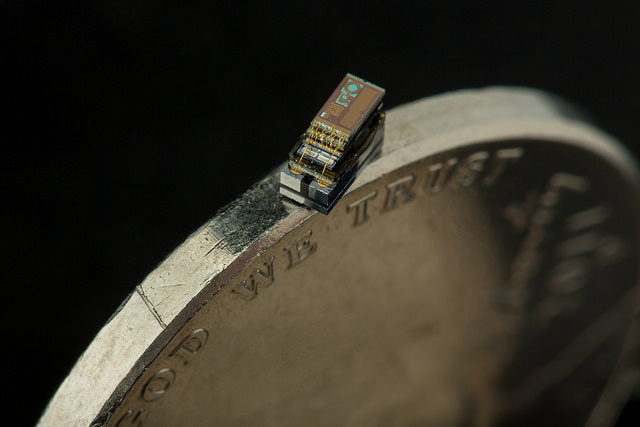MBus is the missing interconnect for millimeter-scale systems
The M3 is a fully autonomous computing system that acts as a smart sensing system.

 Enlarge
Enlarge
In 2012, Michigan faculty members David Blaauw, Dennis Sylvester, David Wentzloff, Prabal Dutta and several graduate students created the Michigan Micro Mote (M3), the world’s smallest computer. The computer measures in at less than a half a centimeter and is a fully autonomous computing system.
The M3 is a fully autonomous computing system that acts as a smart sensing system. A 1000x reduction in volume from today’s state of the art systems, M3 allows computation and intelligence where it literally could not previously go and is a key step from today’s emerging Internet of Things towards tomorrow’s Internet of Everything.

 Enlarge
Enlarge
Looking ahead to millimeter scale computing and the future of ubiquitous computing, EECS faculty members David Blaauw, Prabal Dutta, graduate students Patrick Pannuto and Benjamin Kempke, research scientist Ye-Sheng Kuo, and a number of other Michigan researchers have created MBus, a chip-to-chip interconnect that facilitates an ultra-low power (10’s of uW active) system operation. The researchers state that, “MBus looks ahead to the next generation, the millimeter-scale computing class, and make the critical observation that even if we scale all of the components (processor, radio, sensors, etc.), we will still not be able to produce the viable millimeter-scale systems because we will have no way to put all the pieces together.”
Today, the vast majority of embedded systems use SPI and I2C interfaces, 30-year-old technology. Scaling down to millimeter systems push the power and area limitations so far that these traditional interfaces become unusable. As technology progresses, there is a growing need for an interface to meet the demands of these smaller scale embedded systems, but the design of SPI and I2C is such that they have reached their limits and cannot scale any further. MBus is a new interconnect technology, built for modern systems design and optimized for ultra-low power system operation.
Unlike current devices like laptops and cell phones that put components into a low-power standby state to save energy, so-called “dark silicon”, M3 systems power off components completely – “pitch black silicon” – so that no energy is wasted. Unfortunately, this makes it challenging for components to boot up and reliably talk to each other. MBus addresses this by acting as a “power-aware” interconnect, taking over the power management of components. Since MBus controls the power state of each component, it can provide the appearance that components are always on by waking them before delivering messages. By offloading power management to the interconnect, it also enables traditional components that are not power aware benefit from the energy efficiency of ultra-low power chips.
The M3 project now implements MBus frontends in all its chips, over a dozen different designs that can mix and match into a diverse and growing ecosystem of microscale systems. MBus has proven itself as a viable interconnect for the next computing class.
Looking to the future, the researchers state that “By releasing MBus itself as a free and open standard with a freely available implementation, we aim to encourage its use and adoption by the emerging millimeter-scale systems design community, leading to eventual integration with the broader embedded systems community as millimeter-scale systems become mainstream.”
For more information on MBus and M3, please visit http://mbus.io
 MENU
MENU 
